I need to calculate a CRC16 of N-bytes (5 in the example, for the sake of simplicity) extracted from a binary file of size M (a pair of Kb, not so relevant for my scopes).
printf "offset\tvalue\tcrc16\n";
#Read N bytes from file and copy in the container
for my $counter (0 .. 5- 1)
{
my $oneByte;
read(FH, $oneByte, 1) or die "Error reading $inFile!";
my $ctx2 = Digest::CRC->new( type => 'crc16' );
my $digest2 = ($ctx2->add($oneByte))->hexdigest;
# PRINT for debugging
printf "0x%04X\t0x%02X\t0x", $counter, ord $oneByte;
print $digest2, "\n";
}
Considering this binary input
I obtain the result:
The script is performing byte-by-byte CRC16 (correct by the way), but I need the CRC16 of the full binary stream of 5 bytes (the expected value should be 0x6CD6). Where am I wrong in the script?

